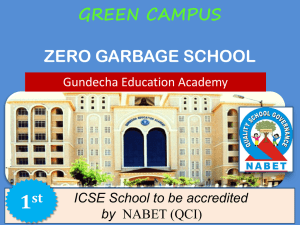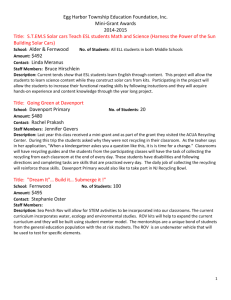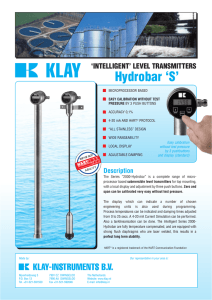File - Kaitlyn Klay
advertisement
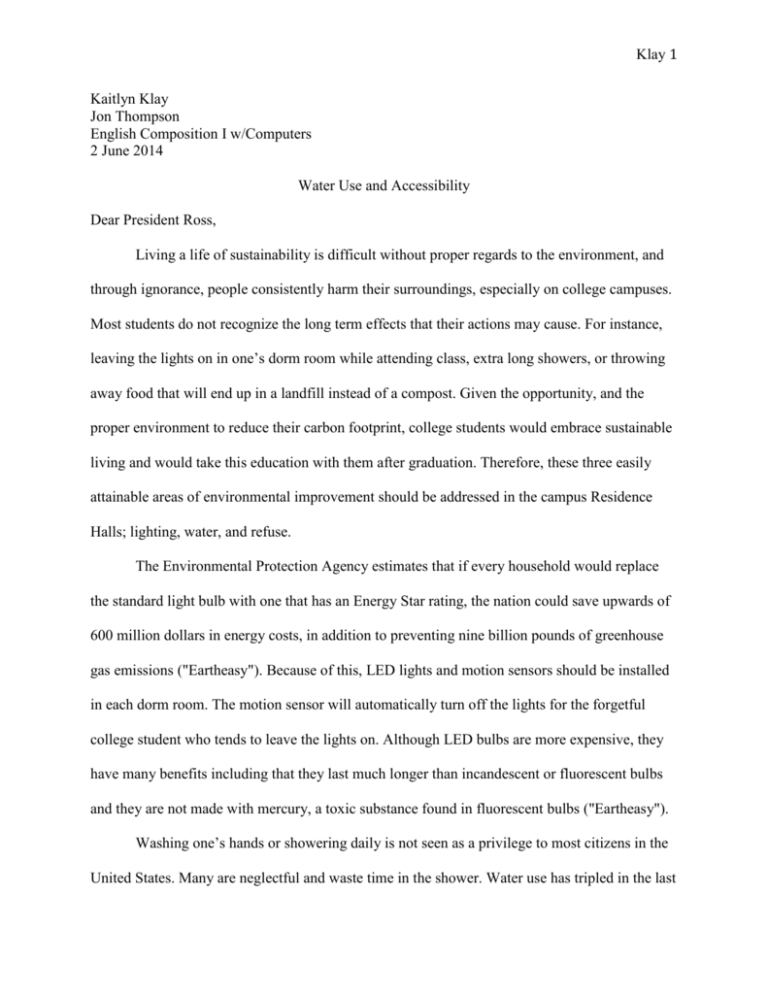
Klay 1 Kaitlyn Klay Jon Thompson English Composition I w/Computers 2 June 2014 Water Use and Accessibility Dear President Ross, Living a life of sustainability is difficult without proper regards to the environment, and through ignorance, people consistently harm their surroundings, especially on college campuses. Most students do not recognize the long term effects that their actions may cause. For instance, leaving the lights on in one’s dorm room while attending class, extra long showers, or throwing away food that will end up in a landfill instead of a compost. Given the opportunity, and the proper environment to reduce their carbon footprint, college students would embrace sustainable living and would take this education with them after graduation. Therefore, these three easily attainable areas of environmental improvement should be addressed in the campus Residence Halls; lighting, water, and refuse. The Environmental Protection Agency estimates that if every household would replace the standard light bulb with one that has an Energy Star rating, the nation could save upwards of 600 million dollars in energy costs, in addition to preventing nine billion pounds of greenhouse gas emissions ("Eartheasy"). Because of this, LED lights and motion sensors should be installed in each dorm room. The motion sensor will automatically turn off the lights for the forgetful college student who tends to leave the lights on. Although LED bulbs are more expensive, they have many benefits including that they last much longer than incandescent or fluorescent bulbs and they are not made with mercury, a toxic substance found in fluorescent bulbs ("Eartheasy"). Washing one’s hands or showering daily is not seen as a privilege to most citizens in the United States. Many are neglectful and waste time in the shower. Water use has tripled in the last Klay 2 50 years and now it is estimated that the average five minute shower uses thirty gallons of water (Behr). With the installation of low flow showerheads in each dorm room, the same five minute shower would use ten gallons. Additionally, the thermostat for the water heat could be reduced by fifteen degrees. This would reduce the amount of fossil fuels needed to head the water, but would still retain a reasonable comfort for residents (Ballad). Recycling on campus is becoming easier for the students. However, recycling stations that would separate refuse by trash, recyclables, and compost should be made available in the cafeterias of each Residence Hall. Out of the 100 million tons of plastic used each year, only 5 percent of it is ever recycled (Kiener). By creating these recycling stations, this gap could be breached. Even more waste could be avoided by putting these recycling stations in the lobbies of each building on campus. Landfills are currently overloaded with common waste that could be recycled or composted, with such activity CMU’s landfill waste could be reduced by up to fifty percent. Composting food and paper items, such as napkins, has little, if any cost associated and responsible recycling can generate a modest income ("Benefits of Composting"). Additionally, the cost of the University’s trash removal would be significantly lowered. Overall, Central Michigan University needs to work to improve the environment by improving campus and students’ energy. By doing this, the university can reduce its energy costs, improve the environment by generating less fossil fuel pollution and over loading landfills and educate its students on how to live a sustainable life. Thank you for your time, Kaitlyn Klay Klay 3 Works Cited Ballad, Tricia. "Home Guides." Home Guides. N.p., 2013. Web. 2 June 2014. Behr, Peter. "Looming Water Crisis." CQ Global Researcher 1 Feb. 2008: 27-56. Web. 2 June 2014. "Benefits of Composting." Benefits of Composting. N.p., 2008-2009. Web. 2 June 2014. Eartheasy.com. "Eartheasy." Energy-Efficient Lighting: LED & CFL Bulb Information, including Where to Buy. Eartheasy.com, 2012. Web. 2 June. 2014. Kiener, Robert. "Plastic Pollution." CQ Global Researcher 1 July 2010: 157-84. Web. 2 June 2014.
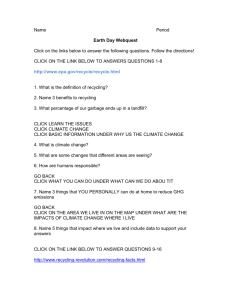
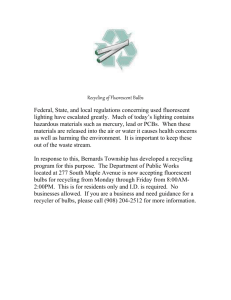
![School [recycling, compost, or waste reduction] case study](http://s3.studylib.net/store/data/005898792_1-08f8f34cac7a57869e865e0c3646f10a-300x300.png)


